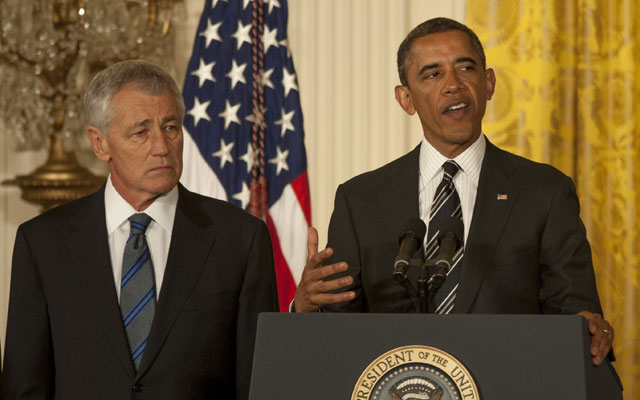When Congress holds hearings on Chuck Hagel’s nomination for Secretary of Defense, they should pay close attention to his position on U.S. space capabilities. As Secretary of Defense, he would have responsibility for ensuring that the U.S. maintains the ability to access space as necessary, a position that is increasingly threatened by the People’s Republic of China (PRC).
Indeed, this past weekend, China conducted another “missile defense test,” involving intercepting one ground-launched system with another. This test, however, could just as easily be part of China’s burgeoning anti-satellite (ASAT) effort, since the interception was in outer space.
The first Chinese test, in 2007, was one of the worst debris-generating events in space history. That test resulted in over 2000 pieces of debris large enough to be tracked, and 35,000 pieces of at least one centimeter in size. Even the small pieces, moving at thousands of miles an hour, are large enough to be able to damage platforms such as the International Space Station, or the recently retired Space Shuttle.
The second test, in 2010, was officially termed by Beijing as “a test on ground-based midcourse missile interception technology within its own territory.” American officials described it as “two geographically separated missile launch events with an exo-atmospheric collision.” But the test is seen as having contributed to Chinese ASAT development as well. This latter test closely resembles this weekend’s Chinese effort.
Not necessarily considered an explicit ASAT test was a subsequent event involving Chinese satellites in August 2010. Two Chinese microsatellites, SJ-06F and SJ-12, “bumped” each other, after repeated maneuvers by the latter, suggesting that this was no accident. Because neither of the satellites was destroyed, this incident is seen as an “orbital rendezvous,” but it could just as easily be portrayed as a test of maneuvering and sensing capabilities that would allow one satellite to collide with another, should Chinese leaders decide this was necessary.
Such tests are consistent with Chinese military doctrinal writings that emphasize the importance of establishing space superiority or space dominance—zhitian quan—in time of war. Careful students of other people’s wars, China’s People’s Liberation Army has noted that advanced militaries, especially American forces, heavily rely on space systems for everything from weather information to communicating and coordinating forces to weapons guidance.
One Chinese assessment notes the increasing number of satellites employed, from 52 in Operation Desert Shield/Desert Storm to 86 supporting North Atlantic Treaty Organization (NATO) operations in the Balkans, to over 100 by the time of the Iraq war in 2003. Another Chinese assessment concluded that the U.S. relied on satellites for 95 percent of reconnaissance and surveillance information, 90 percent of military communications, 100 percent of navigation and positioning, and 10 percent of meteorological and weather forecasting. Consequently, depriving an opponent, such as the U.S., of its space capabilities would cripple its ability to wage modern wars.
Given the recent Chinese ASAT tests, some Members of Congress have been concerned with the possibility that the Obama Administration might pursue space arms control treaties without proper congressional authorization. The National Defense Authorization Act of 2013 specifically limits the creation of any kind of “space code of conduct,” stating (in section 913):
No action shall be taken that would obligate the United States to reduce or limit the Armed Forces or armaments of the United States in outer space in a militarily significant manner, except pursuant to the treaty-making power of the President set forth in Article II, Section 2, Clause II of the Constitution or unless authorized by the enactment of further affirmative legislation by the Congress of the United States.
Yet, the President, in a signing statement, singled out section 913 as one that he would ignore, if necessary, stating that “my Administration will interpret and implement these provisions in a manner that does not interfere with my constitutional authority to conduct diplomacy.”
Meanwhile, it remains to be seen how sequestration will affect U.S. space capabilities, including not only modernization of its orbiting assets, but also improvement in space situational awareness, so as to keep track of both the thousands of pieces of debris, and awareness of possible enemy action against those orbiting assets.
All of this raises important questions that should be posed to Chuck Hagel during hearings regarding his nomination for Secretary of Defense. How important is missile defense, given that other states, including China, are pursuing it? Where does he stand on space arms control, given Congressional limitations? And given China’s burgeoning military capabilities, how will he conduct the “pivot” to Asia in the face of sequestration and reduced defense resources?
